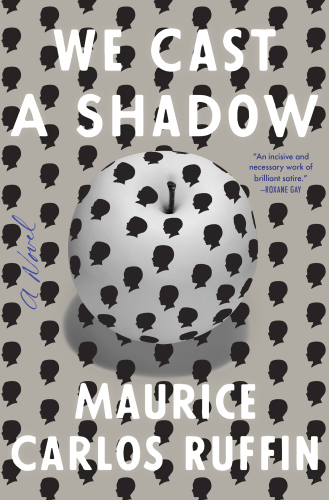
We Cast a Shadow
A Novel
کتاب های مرتبط
- اطلاعات
- نقد و بررسی
- دیدگاه کاربران
نقد و بررسی

Starred review from October 1, 2018
Ruffin’s brilliant, semisatirical debut stars an unnamed narrator who’s all but consumed by his blackness. Forced to become the “committed to diversity” face of his law firm and the pawn of an insidious ad campaign headed by powerful, flirtatious shareholder Octavia Whitmore, the narrator suffers through one indignity after another. He endures a routinely racist police stop and learns that Octavia “fantasized about wearing blackface” and then there’s the historical revisionism at the school his mixed-race teenage son Nigel attends, where teachers insist that “every schoolboy knows the Civil War didn’t start because of slavery.” The narrator only wants Nigel to be spared the dread of being young and black in America. In fact, he’s been forcing Nigel to apply skin-lightening cream over the objections of his wife, Penny, and is planning to submit Nigel to an experimental plastic surgery procedure that he hopes will visibly erase his heritage and break the long chain of prisons, prejudice, and limited career options that characterize the narrator’s own forebears (his father is incarcerated, a fact that brings the narrator nothing but shame). And yet this is only the setup for a story that suddenly incorporates the violent interventions of a militarized cell of protesters, and hastens the narrator, Nigel, Penny, and Octavia toward a set of separate fates that are both harrowing and inevitable. Though Ruffin’s novel is in the vein of satires like Paul Beatty’s The Sellout and the film Get Out, it is more bracingly realistic in rendering the divisive policies of contemporary America, making for a singular and unforgettable work of political art. Agent: PJ Mark, Janklow & Nesbit Assoc.

November 15, 2018
As with Ralph Ellison's Invisible Man, the black narrator of this rakishly funny and distressingly up-to-the-minute debut novel doesn't disclose his name, because, he says, "I'm a phantom, [and] a figment."In a near-future America where racial divisions have become, if anything, deeper and bleaker than they are now, our nameless narrator has, through guile, pluck, spit, and polish, worked his way to associate attorney with Seasons, Ustis & Malveaux, a powerful law firm with tentacles reaching to every stratum of a city known here only as the City. Though wound tight from having to look over his shoulder at every potential office competitor, the narrator is determined to do whatever he can to ingratiate himself with his bosses and secure a full partnership, whether by enduring cornball plantation tours, struggling to overcome courtroom jitters, or agreeing to be chairman and sole African-American member of the firm's "diversity committee." It's all for the sake of his biracial son, Nigel, who has a black birthmark on his face that's grown so large over time that the narrator will try anything to make it fade, from oversized baseball caps for blocking the sun to skin-lightening creams whose application bewilders Nigel and enrages his white mother, Penny. The narrator is desperate for his son to avoid the fate of many other black men who have been consigned either to substandard neighborhoods or, as is the case with the narrator's estranged father, prison. ("The world is a centrifuge that patiently waits to separate my Nigel from his basic human dignity," the narrator laments.) But a bigger paycheck from his firm would enable the narrator to pay for what promises to be the ultimate solution: an experimental medical procedure that will not only remove Nigel's birthmark, but make him look totally Caucasian. Whether they're caused by delusion, naiveté, dread, rage, or some combination thereof, the narrator's excesses sometimes make him as hard for the reader to endure as he is for those who either love or barely tolerate him. But his intensely rhythmic and colorful voice lifts you along with him on his frenetic odyssey.Ruffin's surrealist take on racism owes much to Invisible Man and George S. Schuyler's similarly themed 1931 satire, Black No More. Yet the ominous resurgence of white supremacy during the Trump era enhances this novel's resonance and urgency.
COPYRIGHT(2018) Kirkus Reviews, ALL RIGHTS RESERVED.

Starred review from November 1, 2018
I liked my java so black, the police planted evidence on it, says the wry, self-aware, yet ultimately self-defeating narrator of this trenchant satire. Hired (after a humiliating competition) as the black face of a racist corporation, he embarks on a relentless, single-minded quest to medically demelanize his biracial son, Nigel. Nothing, not the contempt of his wife and mother nor the physical and psychological anguish of his child, will deter him from rescuing the teenager from life as a black man. Set in a disturbingly familiar near future, where entire black neighborhoods are imprisoned in the name of security and the bad blacks can be denuded and deported under the Dreadlock Ordinance, Ruffin's debut novel is a harsh indictment of a society that views blackness as a disorder and that forces black men to choose between self-respect and survival. Nigel's demel procedure may be poisonous, but no more so than the radioactive white folk . . . who can't help but hurt you like what made cancer. Unlike his well-meaning white wife, Nigel's father is under no illusions, for after all, what was equality other than a typographical error in the Constitution? Brilliant and devastating.(Reprinted with permission of Booklist, copyright 2018, American Library Association.)

























دیدگاه کاربران